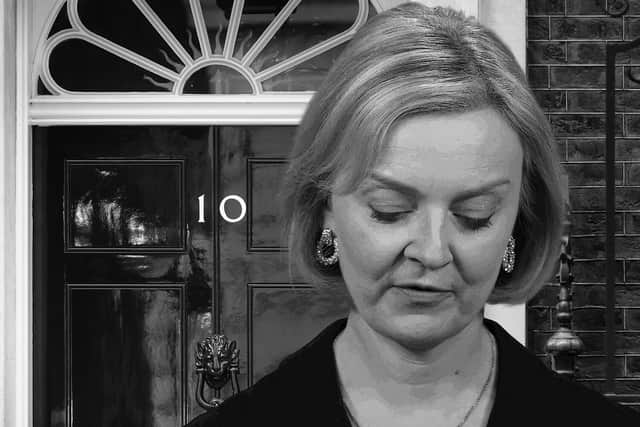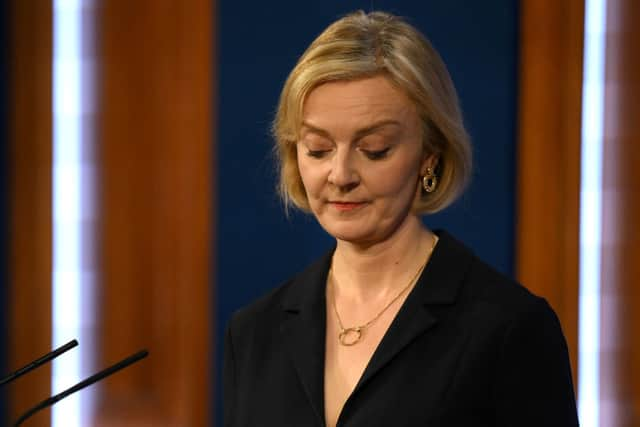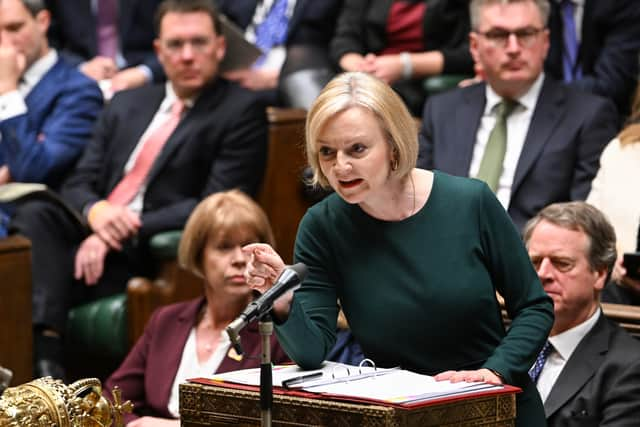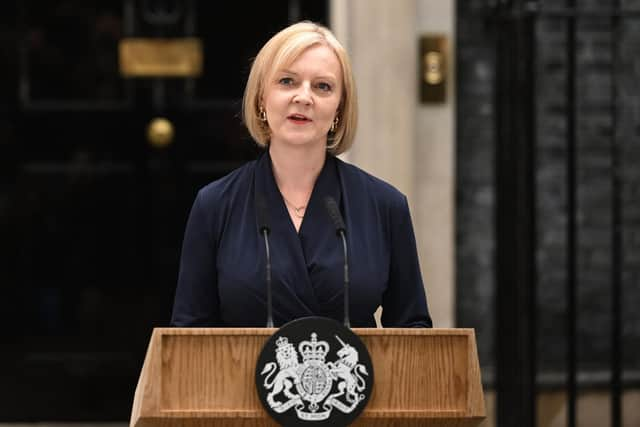Will Liz Truss remain as Prime Minister? How many Tory MPs have called for their leader to resign?
and live on Freeview channel 276
Liz Truss has been Prime Minister for less than 50 days and already people and politicians alike are taking bets on when she’ll be gone. It is a pretty extraordinary place for a new administration to be.
Following the economic crisis provoked by former Chancellor Kwasi Kwarteng’s mini budget, Tory MPs seem to have turned against Truss - with several of them publicly calling for her to hand in her resignation. But surprisingly, it is not just the opposition or Conservative Party backbenchers who are undermining her position as leader - the Prime Minister has now been humiliated by her own Cabinet too.
Advertisement
Hide AdAdvertisement
Hide AdToday (17 October), new Chancellor Jeremy Hunt ditched “almost all the tax measures” from the government’s mini budget, and in doing so, scrapped the economic ethos Truss pushed during her leadership campaign and taken away one of the key arguments she has used to ward off attacks from the Labour Party and other critics over the past few weeks.
Truss’ leading pledge, and the one that differentiated her from her rival Rishi Sunak, was to slash taxes. Her own Chancellor has backtracked on this. Likewise, amidst attacks from all angles in recent weeks regarding her fiscal decisions, Truss has frequently used her energy price plan as her main rebuttal - and praised it as the government’s key success. But this too has disappeared, with Hunt announcing that the price cap will only be universal until April 2023, and not for two years as was originally promised.
So what does all of this mean for the Prime Minister’s future, and how long is she likely to stay in office?


Loss of political authority
Despite backlash and various other shortcomings, up until now, Truss had always stood firm on her beliefs - cutting taxes. Of course, this was not the belief of many. Her leadership opponent Rishi Sunak called her unfunded tax cuts the stuff of “fairytales”, and various other voters, economists and politicians did not see this as the way to go. But Truss remained steadfast and in the now notorious 23 September mini budget, she committed to the policies which had won her the leadership over the summer.
Advertisement
Hide AdAdvertisement
Hide AdBut in one morning, all of this was axed - and the Prime Minister was nowhere to be seen. Instead, Hunt was the one to make this huge political announcement - one which shredded Truss’ very ideology and prompted the question of who is really in charge? You’ll be hard-pressed to find someone who gives Liz Truss as the answer.
But it’s not just today that has prompted questions over whether the Prime Minister has control or not. The same wonderings were raised when she made her first big U-turn on the top rate of income tax. Then again when the financial markets crashed, and she had little to say on a series of challenging local radio interviews. Things have been moving at a frightening pace for a while and it’s difficult to tell when she last had control.
One former cabinet minister told the Guardian things are “unsustainable”, and they are finding it “difficult to believe that this great party and the government of the sixth-strongest economy in the world has such a shambles of a prime minister.” Truss’ most recent actions were also placed under glaring spotlight, as the source continued: “She’s done a U-turn on the policy on which she became prime minister. She’s thrown her best ideological pal under the bus and she’s refused to take questions and done a runner. She’s got to go.”


MPs turning against her
So it is not just a sense of political authority which the Prime Minister has lost, then. She has also lost the support of MPs - even the support of those from her own party.
Advertisement
Hide AdAdvertisement
Hide AdOne of the first high-profile Tory MPs to call for a general election was former Culture Secretary Nadine Dorries, who lashed out at her boss on Twitter earlier this month. She challenged Truss, arguing “if she wants a whole new mandate, she must take to the country” in a reference to the shelving of policies such as the privatisation of Channel 4, the Online Safety Bill and the review of the BBC Licence Fee.
The Mid Bedfordshire MP, who was an avid supporter and ally of Boris Johnson, also claimed Truss had put her predecessor’s “three years of work” on hold - and suggested the Prime Minister’s new policies are not what people voted for when the Conservative Party won its landslide victory in 2019.
More recently, veteran MP Crispin Blunt told Channel 4 that Truss should resign, adding he would be “very, very surprised if there are people dying in a ditch to keep Liz Truss as our Prime Minister.” He argued there are “only two years” until the next general election, and that the Tories need to “show the country we are capable of delivering sound money, sound administration, and all things the Conservative Party is expected to deliver in office.”
Meanwhile, Andrew Bridgen, who supported Rishi Sunak during the leadership race, also denounced the Prime Minister’s leadership. “Liz has sunk her own leadership,” he wrote in a blog post, before going on to claim the “beleaguered” South West Norfolk MP has “run out of friends” and that the country should expect a general election.
Advertisement
Hide AdAdvertisement
Hide AdJamie Wallis added his name to the list of rebels soon after, revealing on Sunday (16 October) that he had written to Truss to ask her to stand down as “she no longer holds the confidence of this country.” He argued she had “undermined” the UK’s economic credibility, and “irreparably fractured” the Conservative Party.
Angela Richardson too broke ranks, telling The Telegraph that it would be "better for the party and for the country to have a change in leadership at the top.” She then stressed that the party must "unite around whoever the new leader is" as “mucking about is not in the public interest.”


Labour storms ahead
However, even if the Prime Minister had the support of the Conservative Party, another issue she is facing is a huge drop in public support. The Labour Party recently stormed to a record lead in opinion polls, with a survey of 1,712 adults conducted by YouGov placing Labour 33 points ahead of the Tories - at 54% compared with just 21% - when voters were asked which party they would choose if a general election took place tomorrow.
While opinion polls are just an estimate of voter intention, and are based on representative samples of the population rather than the whole electorate, they are important for establishing how a political party’s recent decisions or actions have been received by the country’s citizens. In this case, it doesn’t look good for Truss.
Advertisement
Hide AdAdvertisement
Hide AdIn the wake of the polls, Labour leader Keir Starmer said his “hope” of gaining the keys to Number 10 had turned into “belief”. The Holborn and St Pancras MP continued: “We’ve done a huge amount of work to change the Labour Party over the last two years, and the polls are reflecting that… the confidence is reflecting that.”


What happens next?
As the past few months of political upheaval have demonstrated, it’s impossible to say with any certainty how things will develop in and around Number 10. What is clear is that the Prime Minister’s support is waning quickly, and the sense of panic that has accompanied her frantic U-turns, Cabinet reshuffle, and questionable interview performances has done little to help her image.
Truss could choose to call a general election, if she wants to prove she has the support of the public - like many of her predecessors did before her. But this is hugely unlikely, as it seems impossible that she would win. What happens next then, is her fellow MPs must ultimately decide whether they believe she has enough credibility to remain in office - and at the pace at which things are going, a Boris Johnson-style ousting looks increasingly likely.
If Tory MPs do not oust her however, only time will tell what direction the UK will head in next. Perhaps new Chancellor Hunt will take the reins, and Truss will disappear into the background - but if that is the case, is she truly the country’s leader? Maybe she will give in to calls to resign, or possibly even return to the steering wheel - meaning more U-turns may be yet to come.
Advertisement
Hide AdAdvertisement
Hide AdRegardless, one thing, arguably, remains certain. Liz Truss has had one of if not the most turbulent starts to a premiership ever seen before - and the country, as well as her own party, will not forget it anytime soon.
Comment Guidelines
National World encourages reader discussion on our stories. User feedback, insights and back-and-forth exchanges add a rich layer of context to reporting. Please review our Community Guidelines before commenting.
